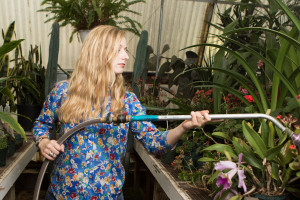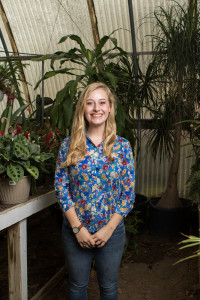By BETHANY SHERROW
Features Editor
(WARRENSBURG, Mo., digitalBURG) — Emily Dunlap probably likes plants more than you do.

Emily Dunlap waters the plants Tuesday in one of the university-owned greenhouses on Broad Street.
“I’m really infatuated with plants; I kind of always have been,” Dunlap said.
When she was in eighth grade, Dunlap’s uncle bet her $20 that she wouldn’t hold onto a shocker toy for five seconds. She accepted the challenge, spent her money on plants and started her first little garden.
“My mom used to read me ‘The Secret Garden’ when I was really little, and I really liked that book and always wanted a garden after that,” Dunlap said. “Then, when I got old enough to where I was like, ‘Yo, I could make a garden if I wanted to,’ I made one.”
She eventually transferred her garden to a new, better spot, and she hasn’t stopped planting seeds since she started that first garden.
Dunlap has a small garden of flowers, a small greenhouse for houseplants and another garden where she grows corn, tomatoes, mint, peppers, cucumbers, gourds and the occasional watermelon.
“My dad used to spit watermelon seeds in my garden, and I didn’t know,” Dunlap said. “Then, they would grow and I’d be like, ‘What is this plant?’ I’m goofy though; I see a weed, I’ll wonder what it is and I’ll leave it and tend to it like it’s one of the other plants. Sometimes, it keeps growing and it’s just a weed, but when my dad was spitting watermelon seeds in my garden and I didn’t know, I let it grow. Eventually, I got 130 pounds of watermelons. There was one that was like 30 pounds. It was so big.”
Dunlap isn’t afraid of huge produce. This summer, she plans on attempting to grow giant pumpkins on her family’s additional farmland in Owensville, Missouri.
“We’re going to try and grow those giant pumpkins, the ones that are like a hundred pounds and people make boats out of,” Dunlap said. “So, that’s our plan for this summer. We’ll see how that goes, but we’re going to try to grow giant pumpkins.”
Dunlap said she has grown a lot as a gardener since she started, but she keeps learning and working because growing plants brings her a sense of accomplishment.
“When I was just starting, it was just so amazing to me that I could take these seeds and plant them and then all of the sudden I would have plants,” she said.
Dunlap is a double major: agriculture science and wildlife, and natural resource conservation. Although she’s passionate about her studies in conservation, she will most likely go into the horticulture field.

Emily Dunlap is a UCM student in agriculture science and wildlife as well as natural resource conservation.
One of Dunlap’s role models is John Muir, whose memoir, “Nature Writings,” sparked her interest in conservation.
“He’s basically the founder of the national park system,” Dunlap said. “He wasn’t political at all though. He convinced Teddy Roosevelt to start the national parks by taking him on a camping trip through Yosemite.”
She has also hiked through Yosemite herself. Last summer, Dunlap and her sister Megan took a month-long trip and saw 15 national parks and five state parks.
“We drove all the way to California and back and went to mostly national parks,” Dunlap said. “It was mostly hiking and experiencing the national parks.”
Dunlap said she was exhausted at the end of most days on the trip, but the whole thing was incredible. Two of her favorite places, Zion National Park and Goblin Valley State Park, were in Utah. Dunlap said she was especially impressed with the landscape inGoblin Valley State Park.
“The whole place was insane because of the landscape,” Dunlap said. “They were just these weird shaped rocks, and you were free to play on all of them. There, you got to do whatever you wanted. Our campsite was behind these two cliffs. It was just very wild.”
She said the trip changed her perspective about how to spend her time and money.
“It just makes me want to experience more with my life rather than going day to day doing work,” she said.
Dunlap’s idol John Muir said that “nothing dollarable is safe.” Dunlap said that means people must make an effort to protect things in nature because if someone can make a dollar off of anything, they will do it.
“Life is not about money,” Dunlap said. “People think, ‘Oh, there’s this beautiful forest, if we cut it all down, we can sell the lumber and make money.’ But, also you’re cutting down a beautiful forest. Is it really worth the money you’re going to get by destroying something so beautiful?”
Dunlap said seeing the incredible redwoods and sequoias in California and knowing that so many of them have been logged and destroyed reaffirmed her passion for conservation. She said preserving all the beautiful parts of nature that the world has is really important, and she encourages people to experience nature for themselves.
“Go on a hike, an overnight hike,” Dunlap said. “Just go out into the woods and don’t come back until you like it. It’s so important to not ruin it. We don’t have to destroy all the natural things that were all ready in the world.”







